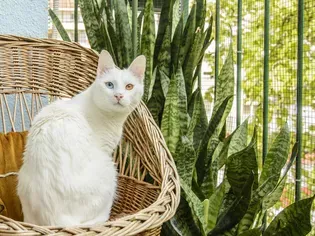Are Snake Plants Toxic to Cats?
Updated on 04/26/24

Are Snake Plants Toxic to Cats? Unraveling the Truth Behind a Common Houseplant
The presence of plants in our homes not only enhances the aesthetic appeal but also helps purify the air. However, as cat owners, we must be cautious about the potential hazards posed by certain plants to our feline companions. One common houseplant that raises concerns is the snake plant, also known as mother-in-law's tongue. In this comprehensive blog post, we will delve into the toxicity of snake plants to cats, exploring the potential risks and providing practical advice to ensure the safety of your furry friends.
Understanding the Snake Plant and Its Toxic Properties
Snake plants (Sansevieria trifasciata) belong to the Asparagaceae family and are native to tropical regions of Africa. They are popular houseplants due to their hardiness, low maintenance, and ability to thrive in various lighting conditions. However, like many other plants, snake plants contain certain chemical compounds that can be toxic to cats if ingested.
The primary toxin in snake plants is saponins, which are glycosides found in the leaves and roots. Saponins have detergent-like properties and can cause gastrointestinal irritation in cats. When ingested, saponins can lead to symptoms such as vomiting, diarrhea, excessive drooling, and abdominal discomfort.
Severity of Symptoms
The severity of symptoms in cats who ingest snake plants depends on several factors, including the amount consumed, the individual cat's sensitivity, and the availability of immediate medical attention. In most cases, ingestion of small amounts of snake plant material may only cause mild gastrointestinal upset that resolves within a few hours. However, in severe cases, excessive vomiting and diarrhea can lead to dehydration and electrolyte imbalance, requiring prompt veterinary care.
Examples of Toxicity
To illustrate the potential toxicity of snake plants to cats, here are a few real-life examples:
* Case 1: A curious kitten chewed on a snake plant leaf and experienced mild vomiting and diarrhea for several hours. With supportive care and plenty of fluids, the kitten recovered fully within a day.
* Case 2: An adult cat ingested a significant portion of a snake plant leaf, resulting in severe vomiting, diarrhea, and abdominal pain. The cat was lethargic and refused to eat or drink, requiring immediate veterinary intervention. Intravenous fluids and medication were administered to prevent dehydration and electrolyte imbalance. After several days of hospitalization, the cat gradually recovered and was discharged with instructions for continued supportive care at home.
Preventing Poisoning
The best way to prevent snake plant poisoning in cats is to keep them out of reach. Here are some practical tips to ensure the safety of your feline friends:
* Place Snake Plants in Inaccessible Locations: Position snake plants on high shelves or in hanging baskets where cats cannot easily access them. Alternatively, consider placing them in a room where cats are not allowed.
* Use Non-Toxic Plant Alternatives: If you have cats and are concerned about the potential toxicity of snake plants, consider opting for non-toxic plant alternatives such as spider plants, ferns, or succulents.
* Supervise Cat Behavior Around Plants: When introducing new plants into your home, supervise your cat's behavior to ensure they do not chew on or ingest any plant material. If you notice your cat showing interest in a snake plant, immediately remove them from the area and provide them with a safe and engaging alternative.
Conclusion
While snake plants are generally considered safe for humans, they can be toxic to cats if ingested. The severity of symptoms varies depending on the amount consumed and the individual cat's sensitivity. To prevent poisoning, it is crucial to keep snake plants out of reach of cats, supervise their behavior around plants, and provide non-toxic plant alternatives. If you suspect your cat has ingested a snake plant, contact your veterinarian immediately for professional advice and treatment. By following these precautions, you can ensure the safety of your feline companions and enjoy the benefits of having plants in your home.
Explore More Pets

Cat Behavior Problems
How to Stop Aggression in Kittens

Long-Haired Cat Breeds
Siberian Cat: Breed Profile, Characteristics, & Care

Cat Behavior Problems
How to Stop Kittens From Scratching and Biting

Long-Haired Cat Breeds
Turkish Angora: Cat Breed Profile, Characteristics & Care

Basic Training
How to Socialize Your Kitten

Short-Haired Cat Breeds
Cute Pictures & Facts About Calico Cats & Kittens

Litter Box Training
Training Your Kitten to Use the Litter Box

Long-Haired Cat Breeds
10 Fun Facts About White Cats